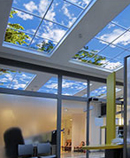
|
|
Researching the convergence of architecture and neurobiology Maharishi University of Management alumnus David Navarrete is director of research initiatives and content development at Fairfield’s Sky Factory. He recently co-authored a white paper about how the company’s architectural illusions of sky and nature, installed in ceilings and windows, actually help people feel more connected to nature—even when they’re in windowless rooms. David was 15 when he came to Fairfield from Mexico to attend Maharishi School. He went on to Maharishi International University (former name of Maharishi University of Management) where he earned a double major in business and government (‘92) plus an MBA (‘93). He later obtained a master’s degree in public relations from Boston University (‘97). In 1998, David gained extensive experience in mass communications working for Hill & Knowlton, a global PR firm, out of their Mexico City office, but returned to Fairfield in the fall of 2000 to work locally during the dot-com boom. When he landed the Sky Factory job in 2013, he became fascinated with the research and connection between architectural illusions and neurobiology. “Architects are beginning to realize that the interior environment has a very powerful cognitive effect on the occupant,” he said. Over the past several years, David has led several research collaborations with various health institutions around the world to study the therapeutic effects of architectural illusions using functional magnetic resonance imaging technology and explore the neural pathways involved in the perception of photographic Open Sky Compositions. A 2017 multidisciplinary study conducted at Texas Tech University (TTU) earned him and his colleagues a Certification of Research Excellence (CORE) by the Environmental Design Research Associations (EDRA). David, who is a teacher of the Transcendental Meditation technique, says his practice of the TM technique has helped him manage stressful work environments. “In architecture and healthcare everyone is looking at the powerful way the environment affects people’s experience, but they are still looking to the external environment as the primary means to influence that experience,” David said. “MUM gives you the ability to experience your internal environment—your own consciousness. If you can experience the deepest level of your own internal environment, then you naturally extend into the external environment. You bring empathy and receptiveness into the world, tapping more of your creativity and happiness.
© Copyright 2017 Maharishi University of Management
|
|


